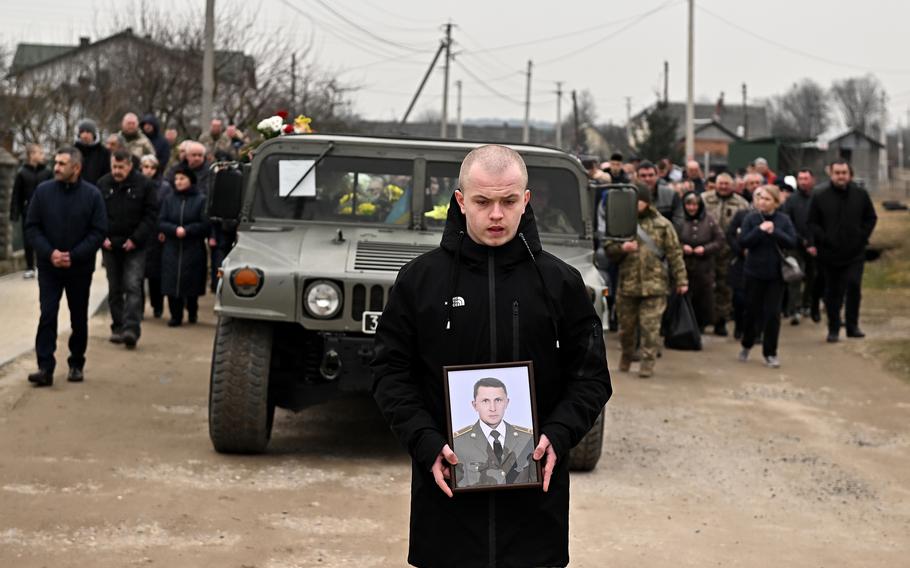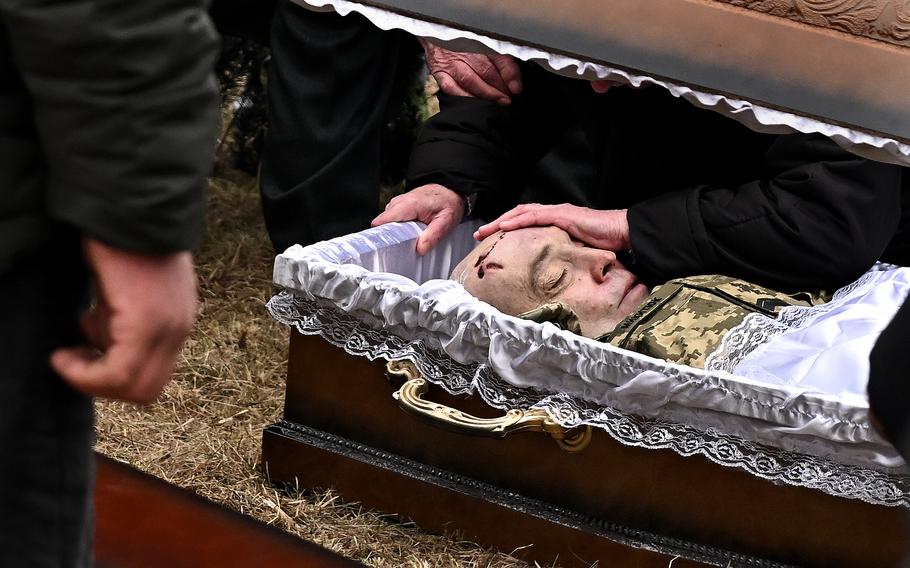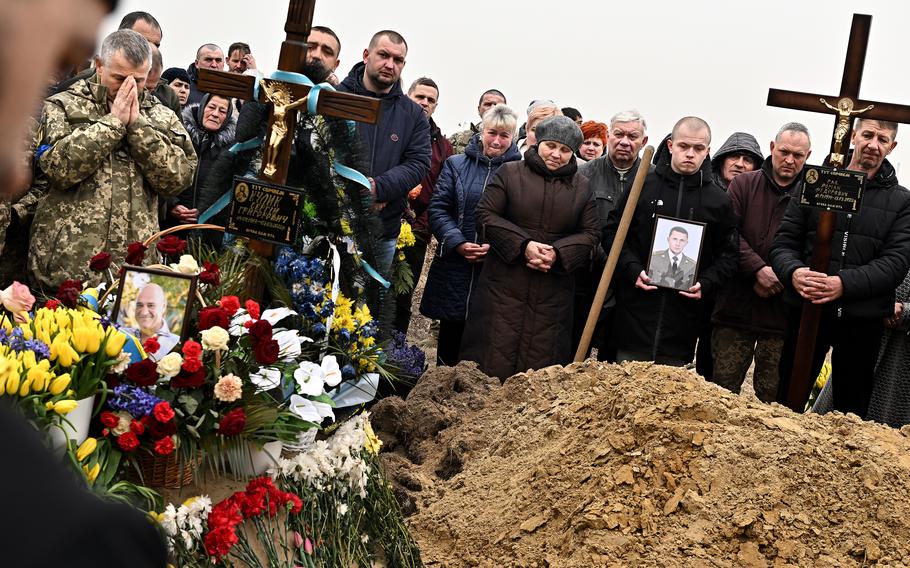
A funeral procession carrying the casket of two Ukrainian soldiers makes its way through the streets of Starychi, Ukraine, on Wednesday, March 16, 2022. The men were killed at the International Training Center by a Russian missile. (Wally Skalij, Los Angeles Times/TNS)
STARYCHI, Ukraine (Tribune News Service) — They hoisted the coffins into a pair of beat-up Humvees, then began the slow trek from the church to the village cemetery, past a muddy stream, railroad tracks and a stretch of woods.
A couple of soldiers at the head of the procession held up a wooden cross and a Ukrainian flag. A man in a dark coat carried a picture of one of the fallen.
A military brass band, its members decked out in camouflage gear, played dirges as the cortege moved forward under overcast skies. Residents came out of their homes to line the roadway and pay their respects. Many made the sign of the cross. Some knelt. A few cried.
Tense expressions among the mourners betrayed a sense that this was only the beginning. More such scenes would come to Starychi, a village of 3,400 in western Ukraine where rise the gold domes of the Nativity of the Blessed Virgin Mary Church, some 15 miles from the Polish border.
But on Wednesday it was the wooden coffins of soldiers Roman Ruck, 48, who left a wife and two sons, and Mykola Mykytyuk 54, survived by a wife and four daughters, that were lowered into the earth. Their ranks were not given, but it was said both had been in the army for decades.
The sounds of shovels scraped, echoing over a brown field and through branches of leafless trees.

A mourner touches the forehead of a Ukrainian soldier during a funeral on Wednesday, March 16, 2022. (Wally Skalij, Los Angeles Times/TNS)
They were among at least 40 Ukrainian service members killed, authorities say, when Russian cruise missiles hit a nearby military training compound in the predawn hours Sunday. The base, known as the International Peacekeeping and Security Center, once housed military personnel from the United States and other NATO and allied nations. All foreign trainers are said to have left Ukraine when Russia attacked Ukraine last month.
The strike was a jolt for the region close to the city of Lviv, which has long been largely insulated from the war despite being a way station for multitudes of refugees bound for Poland. Many Lviv residents barely take notice of the almost daily air raid sirens that echo across town.
However, the surrounding region houses various military installations, including the bombed training base, a sprawling compound that dates from the Soviet era and is now reported to be a hub of instruction for the many foreign volunteers who have traveled to Ukraine to join the fight against Russia. The location of this and other Ukrainian bases is well known to Kremlin war planners. Sunday's attack might not be the last such bombardment in the vicinity, many acknowledge, even if the ground war raging around the capital, Kyiv, and elsewhere remains distant.
"They said at first the war wouldn't last long," said a mourner who gave her name only as Myroslava, preferring, like others, not to be fully identified for privacy reasons. "Now it looks like it will drag on."
Precise casualty numbers are among the most elusive figures in combat. All sides tend to underreport their own losses, while embellishing enemy casualties. On Saturday, Ukrainian President Volodymyr Zelenskyy said 1,300 Ukrainian soldiers had been killed since Russia attacked on Feb. 24. It was the first official update since the first day of the war.
Ukraine has said that some 12,000 Russian troops have been killed, a number unconfirmed in Moscow. The Russian military last reported about 500 dead troops two weeks ago, and said Ukrainian losses approached 3,000.
As for civilians, the United Nations estimates that close to 700 have been killed and more than 1,140 injured since the invasion began. But an inability to confirm casualty counts amid ongoing fighting means the actual figures are likely much higher, the U.N. says.
On Wednesday, authorities were still digging up remains at the site of the weekend's Russian missile strikes, said Volodymyr Yaroslavovych, mayor of the municipality of Novoyavorivsk, which includes Starychi. Like many others here, he is both appreciative of the support from the United States and its allies, and insistent that a no-fly zone is needed to neutralize Russia's aerial superiority — a position also pushed by Zelenskyy.
"We will win the war with Russia no matter what, with or without help from the EU (European Union) and NATO," the mayor said in an interview in his office. "It's just that it will be at a very high price for the Ukrainian people."
The West will regret its reticence to counter Russian air power, he warned. "Your next generation will be ashamed to look into the eyes of our children who buried their parents, and parents who buried their children," said the mayor, an intense, muscular figure in a black T-shirt.
Of course, imposing a no-fly zone over Ukraine could put the United States and its allies into direct conflict with Russia, potentially triggering a much wider conflict. So far, the North Atlantic Treaty Organization has ruled out the idea. However, that geopolitical logic doesn't go down well in Ukraine, where many see themselves fighting alone in a David versus Goliath struggle against a superpower.
"I think that none of the NATO countries alone would stand in war against Russia for more than a week," the mayor said. "There is no country in the world that is so united and has such a high spirit for victory as Ukraine."
Funerals like the one here in Starychi have been taking place throughout Ukraine as bodies are brought back from front lines and recovered from sites of clashes, bombings or other incidents. In the southern city of Mariupol, Russian shelling is so incessant that the dead are wrapped in blankets and hurried to a mass grave.

Mourners gather for the burial of two Ukrainian soldiers during a funeral Wednesday, March 16, 2022. (Wally Skalij, Los Angeles Times/TNS)
At the Starychi cemetery, priests completed final prayers as family members listened and stared hard at the flag-draped coffins. One casket was opened, and an elderly woman dressed in black and wearing a veil, presumably the mother of the deceased soldier, kissed his forehead. He appeared to have a head wound. The caskets, each with a golden cross embedded on top, were then lowered into the ground. Soldiers and civilians shoveled dirt onto them.
A commander in fatigues said that theirs would not be a lost cause.
"We have vowed to these two warriors that we will banish Russians from our land," the commander said. "That is our promise."
A volley of rifle shots signaled a final send-off.
Afterward, official photos of the two deceased soldiers poked from beneath piles of flowers covering their final resting places.
The two were buried next to the grave of Serhii Kulyk, 54, shot dead on March 3 while defending Kyiv, the military said. Kulyk, a resident of Starychi, left behind a wife and two daughters.
The three plots are side by side in an empty stretch of land adjoining the town cemetery. There is some talk of a monument honoring the dead. The bare field has ample space for more victims in a war that shows no signs of concluding anytime soon.
©2022 Los Angeles Times.
Visit at latimes.com.
Distributed by Tribune Content Agency, LLC.